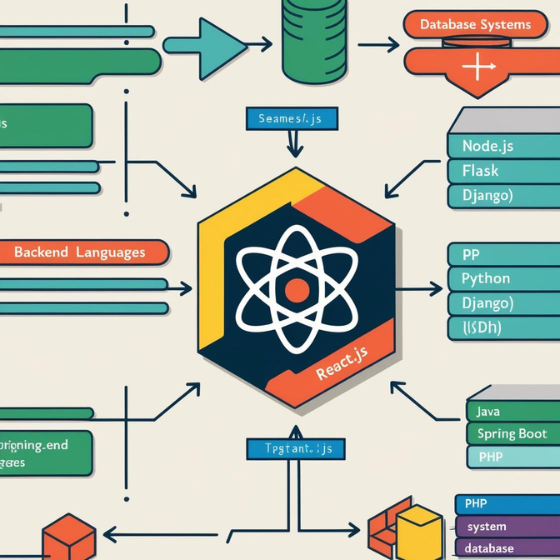The Impact of React.js on Development Efficiency
Introduction:
In the rapidly evolving world of web development, efficiency is key to staying ahead. Did you know that 75% of users form an opinion about a website in less than 0.05 seconds? This statistic highlights the critical role that frontend development plays in shaping user experiences. In this blog, we will explore the impact of React.js on development efficiency, focusing on how it enables faster, more effective development workflows and better performance. If you’re wondering how React can benefit your next project, you’re in the right place.
What is React.js and Why Does It Matter?
Before diving into the impact of React.js on development efficiency, let’s start with a quick overview of React.js. React is a JavaScript library used for building interactive user interfaces and single-page applications (SPAs). Its component-based architecture and virtual DOM system have revolutionized how developers build and manage modern applications. Now, let’s explore how React.js enhances development efficiency.
1. React’s Component-Based Structure: Streamlining Development
One of the key reasons React.js impacts development efficiency is its component-based structure. Developers can break down applications into small, reusable components, each responsible for rendering a portion of the UI.
Benefits of a Component-Based Approach:
- Reusability: Reusing components across different parts of the app saves time and avoids redundancy. For example, a single button component can be reused throughout various pages.
- Easier Maintenance: With smaller, isolated components, it’s easier to update or debug specific parts of the application without affecting others.
- Faster Development Time: By relying on reusable components, developers can speed up the development process, focusing more on functionality than on building UI elements from scratch.
If you’re looking to improve your web application’s efficiency, React’s component-based system can dramatically reduce the amount of code you write, allowing for faster delivery times.
2. Boosting Performance with Virtual DOM
Performance is critical in any web application, and React excels in this area thanks to its virtual DOM. The virtual DOM allows React to efficiently update only the necessary parts of the real DOM, improving the application’s overall speed.
How the Virtual DOM Enhances Performance:
- Efficient Re-rendering: React uses a virtual DOM to update only the elements that have changed, minimizing unnecessary updates and improving performance.
- Faster Page Loads: React reduces the time spent on reflow and repaint processes, ensuring pages load faster and run smoother.
- Better User Experience: By updating only the changed parts of the UI, React ensures a more fluid and responsive user experience.
With React.js, you can create applications that not only look great but perform exceptionally well, which is a critical aspect of development efficiency.
3. Simplified State Management in React
State management in React is another feature that improves development efficiency. React’s built-in state management system makes handling dynamic data straightforward. Whether using the basic useState hook or a more complex solution like Redux, React streamlines state management across applications.
How React Simplifies State Management:
- Predictable State Changes: React’s unidirectional data flow ensures that state changes are predictable, making it easier to track and debug the application’s behavior.
- Component-Specific State: Each component in React can manage its own state, which keeps data handling localized and easier to manage.
- Global State Management: For more complex applications, React provides tools like Redux and the Context API for managing global application state across multiple components.
By offering solutions for both local and global state management, React.js enables faster and more efficient development cycles, making it a go-to solution for developers looking to enhance development efficiency.
4. JSX: Improving Collaboration and Development Speed
JSX (JavaScript XML) is a syntax extension for JavaScript that allows developers to write HTML-like code inside JavaScript. While this may seem unconventional at first, JSX actually contributes significantly to the impact of React.js on development efficiency.
Why JSX Is Beneficial:
- Easier to Read and Write: Combining HTML and JavaScript in one file simplifies the development process and enhances readability.
- Improved Collaboration: With JSX, frontend developers and UI/UX designers can work together more effectively. Designers can quickly understand the UI structure, while developers can easily iterate on it.
- Faster Prototyping: With JSX, it’s quicker to build and modify UI components, which accelerates the development and testing cycles.
By using JSX, React enhances collaboration and reduces friction between team members, ultimately speeding up the development process.
5. A Thriving Ecosystem and Community
React’s extensive ecosystem is another reason the impact of React.js on development efficiency is so profound. The React community is one of the largest and most active in the tech industry, offering a wealth of resources, libraries, and tools that further boost productivity.
React’s Ecosystem Includes:
- React Router: For navigation and routing in single-page applications.
- Redux and Context API: For more advanced state management solutions.
- React Testing Library: For improving testing practices.
React’s strong ecosystem ensures that developers can find solutions to common challenges, reducing development time and enhancing development efficiency.
Conclusion:
In summary, React.js has had a transformative impact on development efficiency. Through its component-based architecture, virtual DOM, streamlined state management, and JSX syntax, React enables faster development, improved performance, and better collaboration. With a thriving ecosystem of libraries and tools, React empowers developers to create efficient, high-performance web applications at scale.
Are you looking to harness the power of React.js for your next web project? Explore our React Development Services at Sodio, where our expert developers can help you build fast, responsive, and scalable applications. Reach out today to discuss how we can accelerate your development process!







